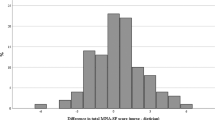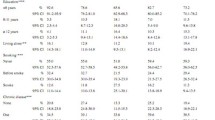Abstract
Objective
To contribute to the validation of the revised BMI-MNA-SF and CC- MNA-SF with regard to association and agreement with the full-MNA, considered as gold standard, in nursing homes in Spain.
Design
Prospective analysis.
Setting
Nursing homes.
Participants
Eight hundred ninety five subjects aged 65 or older meeting inclusion criteria.
Measurements
Correlation, diagnostic accuracy and agreement between the revised MNA short forms and the MNA full form.
Results
The MNA-SFs correlated strongly with the full MNA version (Pearson’s correlation coefficient r=0.904; p<0.001). High values of sensitivity, specificity and predictive values were obtained for the BMI- MNA-SF and CC-MNA-SF against the full-MNA when the dichotomized categorizations “malnourished-at risk of malnutrition” vs “well nourished” and “malnourished” vs “at risk of malnutrition-well nourished” were considered (Youden’s index at least 0.695 in all cases). Areas under the ROC curves also reached high values (BMI-SF: 0.950 and CC-SF: 0.923 for the first categorization; BMI-SF: 0.979 and CC-SF: 0.978 for the second one) showing both tests excellent accuracy with the full-MNA. The agreement between the MNA-SFs and the full-MNA was quantified as the percentage of correct classifications. The BMI-MNA-SF classified 83.80% correctly and the CC-MNA-SF classified 78.55% correctly. Significant proportions of subjects were underestimated by both MNA-SFs. Just about 6% of overestimations were found in both cases.
Conclusion
The revised BMI-MNA-SF and CC-MNA-SF are rapid, easy and reliable tools capable to identify malnourished individuals and those who are at risk of malnutrition with minimal misclassifications with potential harm in nursing home residents. Due to the special characteristics of elderly staying in these institutions, the CC-MNA-SF is a good option to replace the BMI-MNA-SF when BMI is not available.
Similar content being viewed by others
References
Guigoz Y, Vellas B, Garry PJ. Mini Nutritional Assessment: A practical assessment tool for grading the nutritional state of elderly patients. Facts Res Gerontol 1994;4(suppl 2):15–59.
Rubinstein LZ, Harker JO, Salvá A et al. Screening for undernutrition in geriatric practice: Developing the short-form Mini Nutritional Assessment (MNA-SF). J Gerontol A Biol Sci Med Sci 2001;56A:M366–372
Kaiser MJ, Bauer JM, Ramsch C et al. MNA-International Group. Validation of the Mini Nutritional Assessment short-form (MNA-SF): A practical tool for identification of nutritional status. J Nutr Health Aging 2009;13:782–788
Bonnefoy M, Jauffret M, Kostka T, Jusot JF. Usefulness of calf circumference measurement in assessing the nutritional state of hospitalized elderly people. Gerontology. 2002;48(3)162–169
Kaiser MJ, Bauer JM, Uter W et al. Prospective validation of the Modified Mini Nutritional Assessment Short-Forms in the Community, Nursing Home and Rehabilitation Setting. J Am Geriatr Soc 2011;59:2124–2128
Kulnik D, Elmadfa I. Assessment of the nutritional situation of elderly nursing home residents in Vienna. Ann Nutr Met 2008;52Suppl 1:51–53 Epub
Ruiz-Lopez MD, Artacho R, Oliva P, Moreno Torres R, Bolaños J, de Teresa C, Lopez MC. Nutritional risk in institutionalized older women determined by the Mini Nutritional Assessment test: what are the main factors? Nutrition 2003 Sep;19(9):767–771
Ramon JM, Subirá y Grupo español de investigación en Gerontología. Prevalencia de Malnutrición en la población anciana española. Med Clin 2001; 117:766–770.
Bleda MJ, Bolibar I, Parés R, Salvá A. Reliability of the mini nutritional assessment (MNA) in institutionalized elderly people. J Nutr Health Aging 2002;6(2):134–137
Jürschik Jimenez P, Puig-Gros JT, Solá martí R, Nuin Orreo C, Botigué Satorra T. Nutritional status of Catalonia’s elderly people with different health care needs. Arch Latinoam Nutr 2009 Mar;59(1):38–46.
Jiménez Sanz M, Sola Villafranca JM, Pérez Ruiz C et al. Study of the nutritional status of elders in Cantabria. Nutr Hosp 2011;26(2):345–354.
Landis JR, Koch GG. The measurement of observer agreement for categorical data. Biometrics 1977;33:159–174
Brownie S. Why are elderly individuals at risk of nutritional deficiency? Int J Nurs Pract 2006;12:110–118
Raynaud-Simon A, Lesourd B. Malnutrition in the elderly. Clinical consequences. Presse Med 2000; 29, 2183–2190
Omran ML, Morley JE. Assessment of protein energy malnutrition in older persons, part I. History, examination, body composition and screening tools. Nutrition 2000;16:50–63
Elia M, Zellipour L, Stratton RJ. To screen or not to screen for adult malnutrition? Clin Nutr 2005;24:867–884
Boström AM, Van Soest D, Kolewaski B, Milke DL, Eastabrooks CA. Nutrition status among residents living in a veterans’ long-term care facility in Western Canada: a pilot study. J Am Med Dir Assoc 2011 12(3):217–225
Pauly L, Stehle P, Volkert D. Nutritional situation of elderly nursing home residents. Z Gerontol Geriat 2007;40:3–12
Author information
Authors and Affiliations
Corresponding author
Rights and permissions
About this article
Cite this article
Garcia-Meseguer, MJ., Serrano-Urrea, R. Validation of the revised mini nutritional assessment short-forms in nursing homes in Spain. J Nutr Health Aging 17, 26–29 (2013). https://doi.org/10.1007/s12603-012-0079-z
Received:
Accepted:
Published:
Issue Date:
DOI: https://doi.org/10.1007/s12603-012-0079-z




